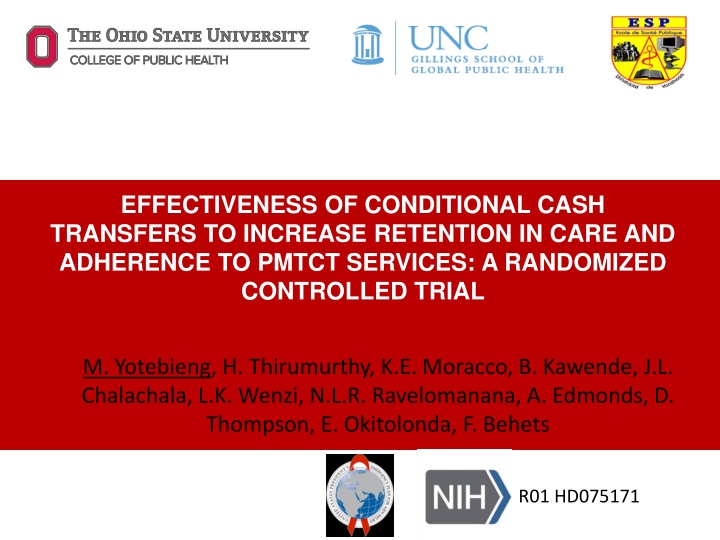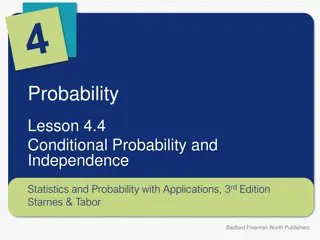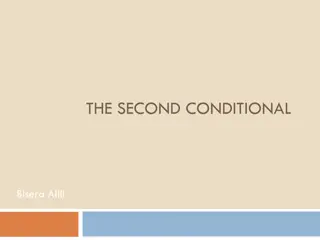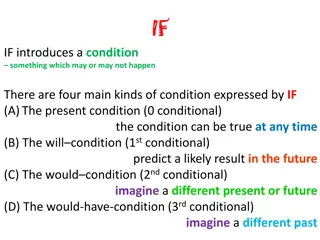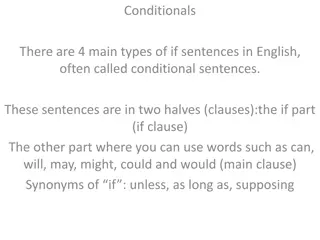Effectiveness of Conditional Cash Transfers in Improving PMTCT Retention & Adherence
This study evaluates the impact of conditional cash transfers on retention and adherence to PMTCT services through a randomized controlled trial in the DRC. Results show significant improvements in retention and adherence rates at six weeks postpartum.
Download Presentation

Please find below an Image/Link to download the presentation.
The content on the website is provided AS IS for your information and personal use only. It may not be sold, licensed, or shared on other websites without obtaining consent from the author.If you encounter any issues during the download, it is possible that the publisher has removed the file from their server.
You are allowed to download the files provided on this website for personal or commercial use, subject to the condition that they are used lawfully. All files are the property of their respective owners.
The content on the website is provided AS IS for your information and personal use only. It may not be sold, licensed, or shared on other websites without obtaining consent from the author.
E N D
Presentation Transcript
EFFECTIVENESS OF CONDITIONAL CASH TRANSFERS TO INCREASE RETENTION IN CARE AND ADHERENCE TO PMTCT SERVICES: A RANDOMIZED CONTROLLED TRIAL M. Yotebieng, H. Thirumurthy, K.E. Moracco, B. Kawende, J.L. Chalachala, L.K. Wenzi, N.L.R. Ravelomanana, A. Edmonds, D. Thompson, E. Okitolonda, F. Behets R01 HD075171
DRCs STRATEGIES TO ELIMATE MOTHER- TO-CHILD TRANSMISSION OF HIV Source: National AIDS Program
Number of pregnant women and infants initiated on ARV in DRC: 2010-2013 Pregnant women Infants eMTCT targets Source: National AIDS Program, Progress report 2014
Retention along the PMTCT cascade among 52,364 pregnant women in 36 maternal and child health clinics in Kinshasa: Jan-Dec. 2011
Methods Study Objectives Evaluate the effect of conditional cash transfer on adherence to the PMTCT cascade and uptake of PMTCT interventions through delivery and the infant s six week visit. Eligibility criteria < 32 weeks pregnant Newly diagnosed with HIV Intent to stay in Kinshasa through at least six weeks postpartum
Methods Intervention After randomization (28-32 weeks) $5 at the first visit after randomization Escalating incentive: $1 + the amount paid at the last visit at subsequent visits Median incentive paid: $26 (IQR: $18-$35) Primary outcomes Retention in care: known to be receiving HIV care at 6 weeks postpartum Adherence: attended all scheduled clinic visits and acceptance of proposed services through 6 weeks
Retention and adherence at six weeks Retention in care Adherence 80.6% 68.5% 52.1% Intervention Control 72.4% PR = 0.70 (95%CI 0.50, 0.99) PR = 1.32 (95%CI 1.13, 1.55)
Loss to follow-up LTFU before delivery LTFU at six week 11.1% 20.3% Intervention Control 5.6% 10.7% PR = 0.50 (95CI% 0.26, 0.98) PR = 0.53 (95CI% 0.33, 0.84)
Conclusions Modest economic incentives were effective in improving PMTCT programmatic outcomes Reduction of non-retention by -30%(CI 95%: -50%, -1%) Increase adherence to full PMTCT services by 32% (CI 95%: 13%, 55%) Reduction of loss to follow-up by -47% (CI 95%: - 67%, -16%) This research contributes to growing evidence that economic incentives are effective in achieving improve health care behaviors in low- income countries
Acknowledgements Profs. Okitolonda, Behets, Wembodinga, Moracco, Thirumurthy, Drs. Kawende, Chalachala, Wenzi, Ravelomanana, Edmonds, Kiketa Mmes. Thompson, Chalachala, Matadi, Mindia, Nlandu, Salisbury, Mr. Kihuma, Kleckner Administrative teams at KSPH, UNC, OSU PEPFAR Implementing partners EGPAF, ICAP - Participants - 90 MCH clinics - UNC - OSU - KSPH - Catholic Health Board - Salvation Army - National AIDS Program - Ministry of Health - CDC - PEPFAR - NIH R01 HD075171
Subgroups Analyses Risk Ratio (95% CI) Unadjusted a Adjusted b Remain in care c Early ANC visit < 20 weeks >= 20 weeks HIV disclosure to anyone Yes No Wealth quintile f Fifth Fourth Third Second first Primiparous Yes No Walk to clinic Yes No 0.76 (0.33, 1.77) 0.69 (0.47, 1.01) 0.79 (0.34, 1.82) 0.70 (0.48, 1.02) 1.05 (0.54, 2.05) 0.60 (0.40, 0.91) 1.00 (0.52, 1.90) 0.62 (0.41, 0.93) 1.10 (0.51, 2.36) 0.72 (0.35, 1.46) 0.89 (0.41, 1.91) 0.41 (0.17, 0.97) 0.54 (0.23, 1.30) 1.26 (0.69, 2.66) 0.73 (0.36, 1.50) 0.86 (0.40, 1.86) 0.41 (0.17, 0.97) 0.47 (0.20, 1.08) 2.31 (0.68, 7.82) 0.61 (0.42, 0.89) 2.02 (0.57, 7.20) 0.63 (0.43, 0.91) 0.53 (0.32, 0.90) 0.89 (0.56, 1.42) 0.54 (0.32, 0.92) 0.90 (0.56, 1.44)
